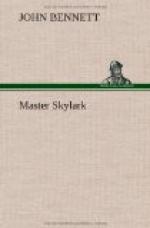[Illustration: “Nick thought of his mother’s singing on A summer’s evening—drew A deep breath and began to sing.”]
A viol overhead took up the time, the gittern struck a few sharp notes. This unexpected music stopped the noise, and all was still. Nick thought of his mother’s voice singing on a summer’s evening among the hollyhocks, and as the viol’s droning died away he drew a deep breath and began to sing the words of “Heywood’s newest song”:
“Pack, clouds,
away, and welcome, day;
With night
we banish sorrow;
Sweet air, blow soft;
mount, lark, aloft,
To give
my love good-morrow!”
It was only a part of a madrigal, the air to which they had fitted the words,—the same air that Nick had sung in the woods,—a thing scarce meant ever to be sung alone, a simple strain, a few plain notes, and at the close one brief, queer, warbling trill like a bird’s wild song, that rose and fell and rose again like a silver ripple.
The instruments were still; the fresh young voice came out alone, and it was done so soon that Nick hardly knew that he had sung at all. For a moment no one seemed to breathe. Then there was a very great noise, and all the court seemed hurling at him. A man upon the stage sprang to his feet. What they were going to do to him Nick did not know. He gave a frightened cry, and ran past the green curtain, through the open door, and into the master-player’s excited arms.
“Quick, quick!” cried Carew. “Go back, go back! There, hark!—dost not hear them call? Quick, out again—they call thee back!” With that he thrust Nick through the door. The man upon the stage came up, slipped something into his hand—Nick, all bewildered, knew not what; and there he stood, quite stupefied, not knowing what to do. Then Carew came out hastily and led him down the stage, bowing, and pressing his hand to his heart, and smiling like a summer sunrise; so that Nick, seeing this, did the same, and bowed as neatly as he could; though, to be sure, his was only a simple, country-bred bow, and no such ceremonious to-do as Master Carew’s courtly London obeisance.
Every one was standing up and shouting so that not a soul could hear his ears, until the ironmonger’s apprentice bellowed above the rest; “Whoy, bullies!” he shouted, amid a chorus of cheers and laughter, “didn’t I say ’twas catched out in the fields—it be a skylark, sure enough! Come, Muster Skylark, sing that song again, an’ thou shalt ha’ my brand-new cap!”
Then many voices cried out together, “Sing it again! The Skylark—the Skylark!”
Nick looked up, startled. “Why, Master Carew,” said he, with a tremble in his voice, “do they mean me ?”
Carew put one hand beneath Nick’s chin and turned his face up, smiling. The master-player’s cheeks were flushed with triumph, and his dark eyes danced with pride. “Ay, Nicholas Skylark; ’tis thou they mean.”




